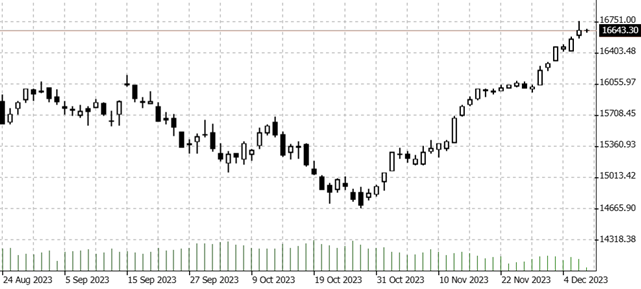

07.12.2023 – After the bull market, many investors have taken their first profits. On Wall Street, but also in Germany. Now all eyes are back on tomorrow’s US labor market report. And soon the Federal Reserve will also have its say again. The market is pondering.
The DAX has just reached a new all-time high. No wonder, inflation in the eurozone has fallen significantly to 2.4 percent. A year ago it was 10.1 percent. According to Director Isabel Schnabel, the European Central Bank will not be raising interest rates any further for the time being. “The final nail in the coffin for further interest rate hikes, even if nobody expected it”, stated economist Andrzej Szczepaniak from the financial firm Nomura. However, attention is now turning back to the USA.

Source: Bernstein Bank GmbH
It is not only in Germany that stock market players have briefly switched from buying frenzy to digestion mode. The latest data certainly pointed to falling interest rates. But for some, fears of a recession were already spreading again.
The job market is cooling
The ADP jobs report was weak, with employment in the US rising by just 103,000 jobs in November, compared to the 130,000 expected. The report from Automatic Data Processing is a harbinger of the official figures tomorrow, as the company tracks around a fifth of jobs in the private labour market. In addition, unit labor costs fell 1.2 percent in the third quarter versus an expected 0.9 percent.
The JOLTS report for October was also dovish, showing that the labor market sank to a two-and-a-half year low. The abbreviation stands for Job Openings and Labor Turnover Survey, which is conducted monthly by the US Bureau of Labor Statistics. All of this should give the Federal Reserve an argument for lowering interest rates again soon. After all, the wage-price spiral has apparently come to a halt. If this is the case in the long term, the bulls are likely to storm off again.
Rather bullish
Meanwhile, Reuters has published a survey showing a slight bullish bias among experts in the eternal tug-of-war between fear of recession and hope of falling interest rates. Of 102 economists surveyed, 52 do not expect the Fed to cut interest rates until July 2024. However, 50 believe that this will happen earlier. And further: 72 experts believe that the Fed is likely to cut rates by 100 basis points or less in the coming year. And all but five assume that the Fed has finished tightening.
However, Scott Rubner from Goldman Sachs recently warned that the rally now has absolutely no fuel left. Now it is time to discuss whether the central bank will really cut interest rates quickly.
NFP ahead
And so investors’ eyes are once again turning to the nonfarm payrolls – the NFP, i.e. the figures from the US non-farm payrolls, are due tomorrow. Most experts are expecting 150,000 new jobs in November. However, October’s figure of 150,000 new openings was already below expectations of 180,000. So keep an eye on the ticker, tomorrow there will be some nice volatility for experienced traders.
If the job market slumps too much, fears of an economic crisis will increase – bearish. If new jobs increase too much, fears of new interest rate hikes will prevail – bearish. However, if the labor market weakens a little, but not too much, hopes of new interest rate cuts will be fueled – bullish.
And then there is the FOMC meeting in the middle of next week. We are curious to see what happens next and will keep you up to date. Whether long or short – Bernstein Bank wishes you successful trades and investments!
_________________________________________________________________________________________________________________________
The content of this publication is for general information purposes only. In this context, it is neither an individual investment recommendation or advice nor an offer to purchase or sell securities or other financial products. The content in question and all the information contained therein do not in any way replace individual investor- or investment-oriented advice. No reliable forecast or indication for the future is possible with respect to any presentation or information on the present or past performance of the relevant underlying assets. All information and data presented in this publication are based on reliable sources. However, Bernstein Bank does not guarantee that the information and data contained in this publication is up-to-date, correct and complete. Securities traded on the financial markets are subject to price fluctuations. A contract for difference (CFD) is also a financial instrument with leverage effect. Against this backdrop, CFD trading involves a high risk up to the point of total loss and may not be suitable for all investors. Therefore, make sure that you have fully understood all the correlating risks. If necessary, ask for independent advice. CFDs are complex instruments and are associated with the high risk of losing money quickly because of the leverage effect. 68% of retail investor accounts lose money trading CFD with this provider. You should consider whether you understand how CFD work and whether you can afford to take the high risk of losing your money.7
